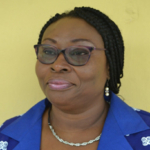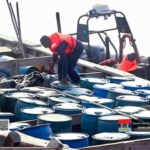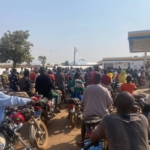
Executive Director of the Ark Foundation and leading women’s rights advocate, Dr Angela Dwamena Aboagye, says the disturbing viral video of a man violently assaulting a woman mirrors the hidden suffering of countless domestic violence victims across Ghana.
Dr Aboagye said she could not watch the full clip due to its severity, but was “not surprised,” stressing that such brutality is far more common than many realise.
“It’s really bad. I saw just a bit of it… But am I surprised? No, because these are things that happen in our society quite a bit. Thousands of women could be going through the same ordeal,” she said.
A snapshot of a wider epidemic
Dr Aboagye explained that domestic violence takes many forms: physical, psychological, economic, sexual, and cultural. The video, she noted, captured both physical and psychological abuse, worsened by the degrading manner in which the woman was filmed.
“Even though there wasn’t anything sexual about it, the fact that she was naked and sitting on the floor is demeaning in a way that borders on the sexual,” she said.
Why some victims flee, even when help is on the way
Reacting to the Ghana Police Service’s statement that the victim fled before officers arrived, Dr Aboagye said this is typical of individuals trapped in long-term cycles of violence.
“Domestic violence is a cycle… research from the late 90s showed married women would endure abuse an average of 35 times before reporting to a formal agency,” she revealed.
“The feeling of being unsafe is very real”, she said in an interview with Asaase Radio.
Communities have normalised abuse
Dr Aboagye said many communities have become desensitised to domestic violence, often treating it as a regular feature of relationships.
“It’s like part of a relationship between men and women. Communities need conscientisation and education to understand what to do when they see these things,” she said.
She added that even children can be taught how to respond when a parent is being abused.
The law is strong — the system is weak
Asked whether Ghana’s laws are adequate, Dr Aboagye was emphatic: enforcement, not legislation, is the real problem.
“I don’t think it’s about the law. We have a good enough law, better than many places. It is about the institutions, the enforcement, the will, the capacity, the sensitivity.”
She criticised inconsistent and sometimes insensitive responses from law enforcement, especially DOVVSU, noting that victims are often left without immediate support or re-traumatised in the process.
“Victims need shelter, psychological help, protection orders, and coordinated services. But institutions do not follow the policies and SOPs that already exist,” she said.
Ghana remains reactive instead of proactive
According to Dr Aboagye, long-term prevention requires well-resourced public education, a mandate the NCCE is best placed, but underfunded, to fulfil.
“No NGO has the money to educate the masses the way NCCE can. Domestic violence is a human rights issue, and until you go to the ground using media and community sensitisation, we won’t see improvement,” she said.
Encouraging women to speak up
Dr Aboagye urged women experiencing abuse to seek help and not remain in silence.
“You don’t have to suffer in silence… Even if the justice system won’t give you what you need, you still have to make the choice to keep safe and heal,” she said.
She highlighted various resources available in urban centres, including NGOs, counsellors, clinical psychologists and support from faith-based and family networks. She added that online platforms now offer practical guidance on safety planning.


